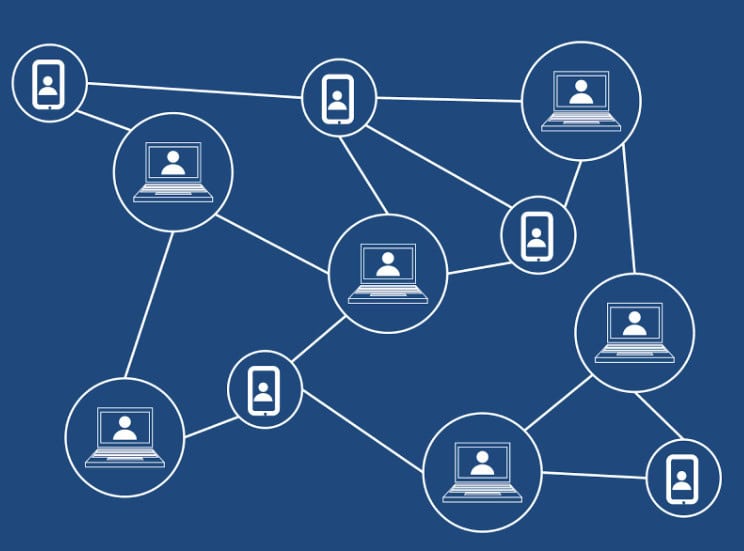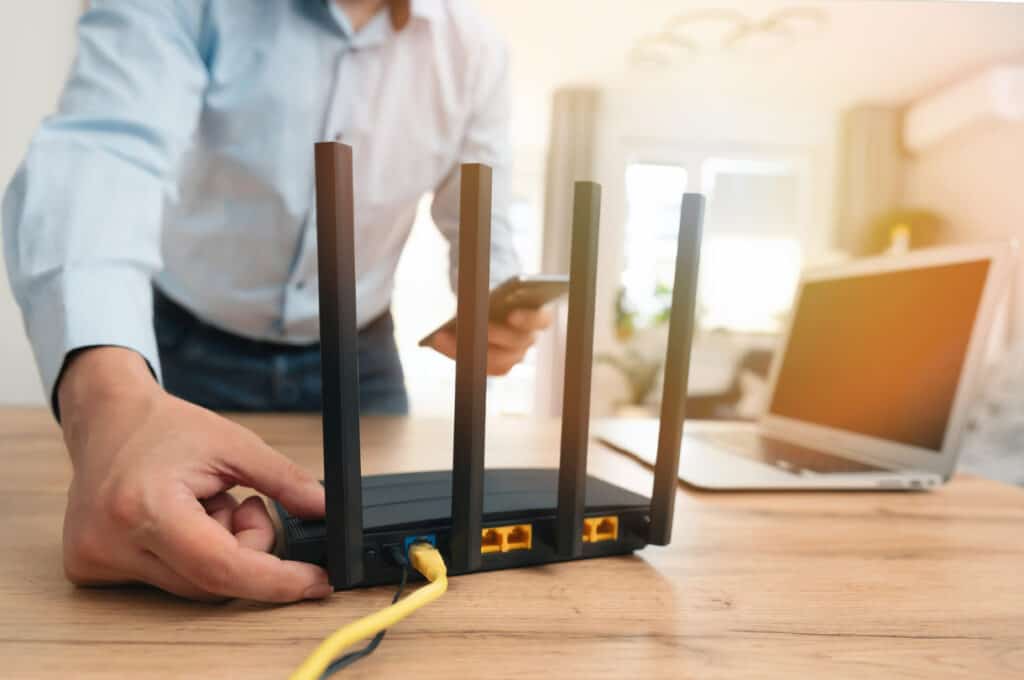Reliable and high-speed internet connectivity is crucial for maintaining productivity and efficiency. Whether you’re a small startup or a large corporation, the right internet solution can make a significant difference in your daily operations.
Table of Contents
This guide aims to help you navigate the myriad options available and choose the best high-speed internet solution for your office. From understanding different types of internet connections to evaluating key factors like speed, reliability, and cost, we’ve got you covered.
Read this guide to choosing office internet to ensure your office stays connected and competitive in the digital age.

Types of Internet Connections
There are several types of internet connections available, each with its own set of advantages and disadvantages. The most common options include DSL, cable, fiber-optic, satellite, and wireless connections.
DSL, or Digital Subscriber Line, uses existing telephone lines to deliver internet service and is usually more affordable, but it may not offer the fastest speeds. Cable internet, on the other hand, leverages the same coaxial cables used for cable TV and typically provides higher speeds than DSL.

Fiber-optic internet is rapidly becoming the gold standard for high-speed connectivity, capable of delivering exceptionally fast upload and download speeds. Satellite internet is an alternative for remote or rural areas where other types of connections may not be available, but it can be susceptible to latency and weather-related issues.
Wireless internet options, such as 4G LTE and the emerging 5G technology, offer flexibility and mobility, making them ideal for businesses with employees who frequently work remotely or travel.
As the people behind Clearwave Fiber Internet note, from downloading files at near-light speed to voluminous amounts of available bandwidth for handling multiple applications simultaneously, to more reliable material components that provide pristine streaming TV and movie experiences, Fiber is simply heads-and-shoulders above cable, DSL, and satellite Internet.
Depending on your business’s specific needs, you may opt for one or a combination of these internet connections.
Assessing Your Office’s Needs
Before selecting an internet connection, it’s vital to assess your office’s unique requirements. Start by considering the size of your team and the nature of your work. For instance, a small team engaged mainly in email correspondence and document sharing might find DSL or cable sufficient.
However, a larger organization reliant on video conferencing, cloud-based applications, and large data transfers would benefit more from the high speeds and reliability of a fiber-optic connection.
Understanding your current and future bandwidth needs can help prevent unnecessary expenditures on an overly robust solution or, conversely, the pitfalls of a subpar connection.
Additionally, think about the digital tools and services your office uses daily. If your team relies heavily on cloud computing platforms like Google Workspace or Microsoft Office 365, a robust and high-speed internet connection is indispensable for seamless operations.
Remote collaboration tools such as Slack, Zoom, or Microsoft Teams also demand higher bandwidth to ensure lag-free communication and data exchanges. Evaluate how critical uninterrupted internet service is to your workflow, and whether you require a backup connection to maintain business continuity during outages.
Cost considerations cannot be overlooked when selecting an office internet solution. It is important to balance affordability with performance and reliability. While fiber-optic connections generally come at a higher price point, the investment may be justified by the substantial gains in speed and efficiency.
Conversely, if budget constraints are a significant factor, combining different types of connections—such as pairing a primary fiber-optic line with a secondary, more economical DSL line—could be a practical solution.
Comparing provider packages and negotiating contracts can also yield favorable terms, ensuring that your office receives the best possible service within your financial means.
Importance of Speed and Bandwidth
Internet speed and bandwidth are two critical factors to consider when choosing an office internet solution. Speed refers to the rate at which data is downloaded or uploaded, usually measured in megabits per second (Mbps) or gigabits per second (Gbps).
Bandwidth, on the other hand, refers to the maximum amount of data that can be transmitted over an internet connection in a given time period. Sufficient speed ensures that your employees can perform their tasks efficiently without facing delays or buffering, which can be detrimental to productivity.
A high bandwidth connection is essential for supporting multiple users and devices simultaneously, preventing network congestion. Understanding the relationship between speed and bandwidth is key to selecting a high-speed internet solution that meets your office’s demands.
Reliability and Uptime
Internet reliability and uptime are crucial aspects that directly impact your business operations. Uptime refers to the amount of time an internet service is operational and available for use.
A reliable internet connection with high uptime ensures minimal interruptions to your workflow, which is essential for maintaining productivity and meeting deadlines. When evaluating different providers, look for those that offer Service Level Agreements (SLAs) guaranteeing a certain percentage of uptime.
Typically, an SLA with 99.9% uptime is considered industry standard, ensuring that your connection will be down for no more than a few minutes each month.
Additionally, inquire about the provider’s support infrastructure, including the availability of technical support and response times, as these factors play a crucial role in the event of service disruptions.
Redundancy is another important consideration for maintaining reliability. Implementing a redundant internet connection means having a secondary internet line, either from the same provider or a different one, that can take over should the primary connection fail.
This failover mechanism ensures that your office remains connected even during unexpected outages, thus safeguarding your operations.
Additionally, consider technologies such as load balancing, which can distribute network traffic across multiple connections, and automatic failover systems that can seamlessly switch between primary and secondary connections without manual intervention.
By investing in a robust infrastructure with redundancy, you can ensure that your business stays resilient in the face of connectivity issues, providing peace of mind for contingency planning.
Understanding Costs and Budgeting
When it comes to selecting an internet solution, cost is always a significant consideration. Internet service providers offer a range of plans at different price points, usually based on speed and bandwidth.
While it may be tempting to choose a cheaper option, it’s important to weigh the benefits of investing in a higher-quality service that meets your business’s needs. Aside from monthly fees, be aware of potential additional costs such as installation fees, equipment rental charges, and early termination fees.
It’s essential to have a clear understanding of the total cost of ownership over the contract period to avoid any budget surprises. By carefully evaluating the costs, you can find an internet solution that provides good value for money while fitting within your budget.
Evaluating Customer Support and Service
Customer support is an essential component of choosing an internet service provider. Reliable customer support can be a lifesaver when technical issues arise, ensuring that any disruptions are quickly addressed, and minimizing downtime.
Look for providers that offer 24/7 customer support with multiple contact methods such as phone, email, and live chat to ensure you can get assistance whenever you need it. Reading customer reviews and testimonials can provide valuable insights into the quality of support offered by an ISP.
Consider reaching out to other businesses to hear about their experiences firsthand. An internet provider with strong customer support can make a significant difference in your overall satisfaction and can ensure that your business operations run smoothly.
Security and Data Protection
Ensuring the security of your internet connection and protecting your data is imperative. Cybersecurity threats such as hacking, phishing, and malware can compromise sensitive business information and disrupt operations.
When selecting an internet service provider, inquire about the security measures they implement to safeguard your connection. Look for ISPs that offer advanced security features such as firewalls, intrusion detection systems, and regular security updates.
Additionally, consider whether the provider offers any data encryption services or virtual private networks (VPNs) to further enhance security. Investing in a secure internet solution helps protect your business from cyber threats and ensures the integrity and confidentiality of your data.
Future-proofing Your Connection
As technology continues to evolve, it’s important to choose an internet solution that can adapt to future advancements. Consider the potential for upgrading your connection as new technologies become available, such as the rollout of 5G networks or improvements in fiber-optic infrastructure.
Future-proofing your internet connection ensures that your office remains at the cutting edge, ready to support new digital tools and innovations. Discuss with your ISP the options for scaling and upgrading your service over time.
Flexibility in contract terms and the ability to easily switch plans or increase speeds can provide peace of mind as your business grows and technology advances. By future-proofing your connection, you’ll maintain a competitive edge and ensure long-term success in the ever-evolving digital landscape.

Selecting the right high-speed internet solution for your office is a crucial decision that can significantly impact productivity and overall business performance.
By understanding the various types of internet connections, assessing your specific needs, and considering key factors such as speed, reliability, and cost, you can make an informed choice that aligns with your goals.
Prioritizing strong customer support, robust security measures, and future-proofing your connection will further ensure that your office remains connected, secure, and poised for growth in the digital age.
Take the time to evaluate your options carefully and choose a solution that not only meets your current requirements but also supports your long-term success.
Guide to Choosing Office Internet – FAQs
1. What factors should I consider when choosing an internet service provider (ISP)?
When selecting an ISP, consider several key factors: internet speed, bandwidth, reliability, customer support, security measures, and cost. Assess your office’s specific needs, such as the number of users and types of activities, to determine the necessary speed and bandwidth.
Evaluate the ISP’s uptime guarantees, support availability, and redundancy options to ensure consistent service. Finally, review the total cost of ownership, including installation fees, equipment rentals, and potential charges for early termination.
2. Why is fiber-optic internet considered superior to other types of connections?
Fiber-optic internet is highly regarded for its exceptionally fast upload and download speeds, which are significantly higher than those offered by DSL and cable connections.
It also provides greater reliability and lower latency, making it ideal for activities requiring robust data transfer, such as video conferencing and cloud computing. Additionally, fiber-optic infrastructure is more resistant to environmental factors, which can lead to fewer disruptions and a more stable connection.
3. How can I ensure the security of my office’s internet connection?
To secure your office’s internet connection, choose an ISP that employs advanced security measures, such as firewalls, intrusion detection systems, and regular software updates. Consider using data encryption services and virtual private networks (VPNs) to protect sensitive information.
Regularly update passwords and educate employees on cybersecurity best practices to further mitigate risks. It’s also prudent to have an incident response plan in place to address any potential security breaches swiftly.
4. What are the benefits of having a redundant internet connection?
A redundant internet connection provides a secondary line of connectivity that activates if your primary connection fails.
This setup ensures continuous internet access, minimizing downtime and disruptions to business operations. Implementing redundancy can involve a backup connection from a different ISP or a different type of connection (e.g., pairing fiber-optic with DSL).
Technologies such as load balancing can enhance redundancy by distributing traffic evenly across multiple connections, further improving reliability.
5. How do I future-proof my office’s internet connection?
To future-proof your office’s internet connection, choose an ISP that offers scalability and flexibility in their plans. Opt for contracts that allow easy upgrades as new technologies become available, such as 5G networks or advancements in fiber-optic infrastructure.
Regularly assess your office’s digital tool requirements and ensure that your current connection can accommodate emerging technologies. Investing in a modern, high-speed internet solution with upgradable options will help maintain your competitive edge and support long-term business growth.



